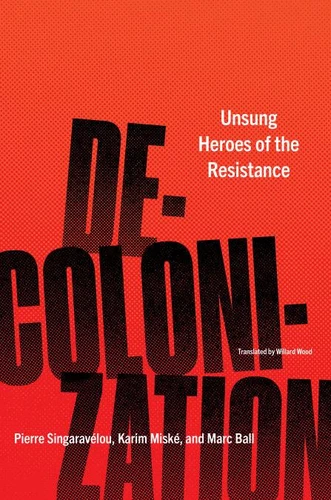Decolonization. Unsung Heroes of the Resistance
Par : , , ,Formats :
Disponible dans votre compte client Decitre ou Furet du Nord dès validation de votre commande. Le format ePub protégé est :
- Compatible avec une lecture sur My Vivlio (smartphone, tablette, ordinateur)
- Compatible avec une lecture sur liseuses Vivlio
- Pour les liseuses autres que Vivlio, vous devez utiliser le logiciel Adobe Digital Edition. Non compatible avec la lecture sur les liseuses Kindle, Remarkable et Sony
- Non compatible avec un achat hors France métropolitaine
 , qui est-ce ?
, qui est-ce ?Notre partenaire de plateforme de lecture numérique où vous retrouverez l'ensemble de vos ebooks gratuitement
Pour en savoir plus sur nos ebooks, consultez notre aide en ligne ici
- Nombre de pages192
- FormatePub
- ISBN978-1-63542-104-0
- EAN9781635421040
- Date de parution01/11/2022
- Protection num.Adobe DRM
- Taille61 Mo
- Infos supplémentairesepub
- ÉditeurOther Press
Résumé
Full of gripping historical vignettes and evocative photographs, an accessible overview of the dynamic figures who resisted colonization, from India, Senegal, and Algeria to Vietnam, Kenya, and Congo. Decolonization started on the very first day of colonization. From the arrival of the Europeans, the peoples of Africa and Asia rose up. No one willingly accepts subjugation, but in order to one day regain freedom, you first and foremost need to stay alive.
Faced with the Europeans' machine guns, the colonized hit back in other ways: from civil disobedience to communist revolution, by way of soccer and literature. It was a struggle marked by infinite patience and unlimited determination, fought by heroic men and women now largely unknown. Condensing a wealth of scholarly research into short, lively chapters, Decolonization brings their extraordinary stories to light: Manikarnika Tambe, the Indian queen who led her troops into battle against the British; Mary Nyanjiru, the Kenyan activist who spearheaded a protest in Nairobi; Lamine Senghor, the Senegalese infantryman who became an anti-colonial militant in Paris; and many more. With them, a current of resistance swept the world, culminating in the independence of almost all the colonies in the 1960s.
But at what price? In the atomic India of Indira Gandhi, in the Congo subjected to Mobutu's dictatorship, or in a London shaken by the rioting of young immigrants, we can see just how crucial it is that we understand and learn from this painful history.
Faced with the Europeans' machine guns, the colonized hit back in other ways: from civil disobedience to communist revolution, by way of soccer and literature. It was a struggle marked by infinite patience and unlimited determination, fought by heroic men and women now largely unknown. Condensing a wealth of scholarly research into short, lively chapters, Decolonization brings their extraordinary stories to light: Manikarnika Tambe, the Indian queen who led her troops into battle against the British; Mary Nyanjiru, the Kenyan activist who spearheaded a protest in Nairobi; Lamine Senghor, the Senegalese infantryman who became an anti-colonial militant in Paris; and many more. With them, a current of resistance swept the world, culminating in the independence of almost all the colonies in the 1960s.
But at what price? In the atomic India of Indira Gandhi, in the Congo subjected to Mobutu's dictatorship, or in a London shaken by the rioting of young immigrants, we can see just how crucial it is that we understand and learn from this painful history.
Full of gripping historical vignettes and evocative photographs, an accessible overview of the dynamic figures who resisted colonization, from India, Senegal, and Algeria to Vietnam, Kenya, and Congo. Decolonization started on the very first day of colonization. From the arrival of the Europeans, the peoples of Africa and Asia rose up. No one willingly accepts subjugation, but in order to one day regain freedom, you first and foremost need to stay alive.
Faced with the Europeans' machine guns, the colonized hit back in other ways: from civil disobedience to communist revolution, by way of soccer and literature. It was a struggle marked by infinite patience and unlimited determination, fought by heroic men and women now largely unknown. Condensing a wealth of scholarly research into short, lively chapters, Decolonization brings their extraordinary stories to light: Manikarnika Tambe, the Indian queen who led her troops into battle against the British; Mary Nyanjiru, the Kenyan activist who spearheaded a protest in Nairobi; Lamine Senghor, the Senegalese infantryman who became an anti-colonial militant in Paris; and many more. With them, a current of resistance swept the world, culminating in the independence of almost all the colonies in the 1960s.
But at what price? In the atomic India of Indira Gandhi, in the Congo subjected to Mobutu's dictatorship, or in a London shaken by the rioting of young immigrants, we can see just how crucial it is that we understand and learn from this painful history.
Faced with the Europeans' machine guns, the colonized hit back in other ways: from civil disobedience to communist revolution, by way of soccer and literature. It was a struggle marked by infinite patience and unlimited determination, fought by heroic men and women now largely unknown. Condensing a wealth of scholarly research into short, lively chapters, Decolonization brings their extraordinary stories to light: Manikarnika Tambe, the Indian queen who led her troops into battle against the British; Mary Nyanjiru, the Kenyan activist who spearheaded a protest in Nairobi; Lamine Senghor, the Senegalese infantryman who became an anti-colonial militant in Paris; and many more. With them, a current of resistance swept the world, culminating in the independence of almost all the colonies in the 1960s.
But at what price? In the atomic India of Indira Gandhi, in the Congo subjected to Mobutu's dictatorship, or in a London shaken by the rioting of young immigrants, we can see just how crucial it is that we understand and learn from this painful history.
















